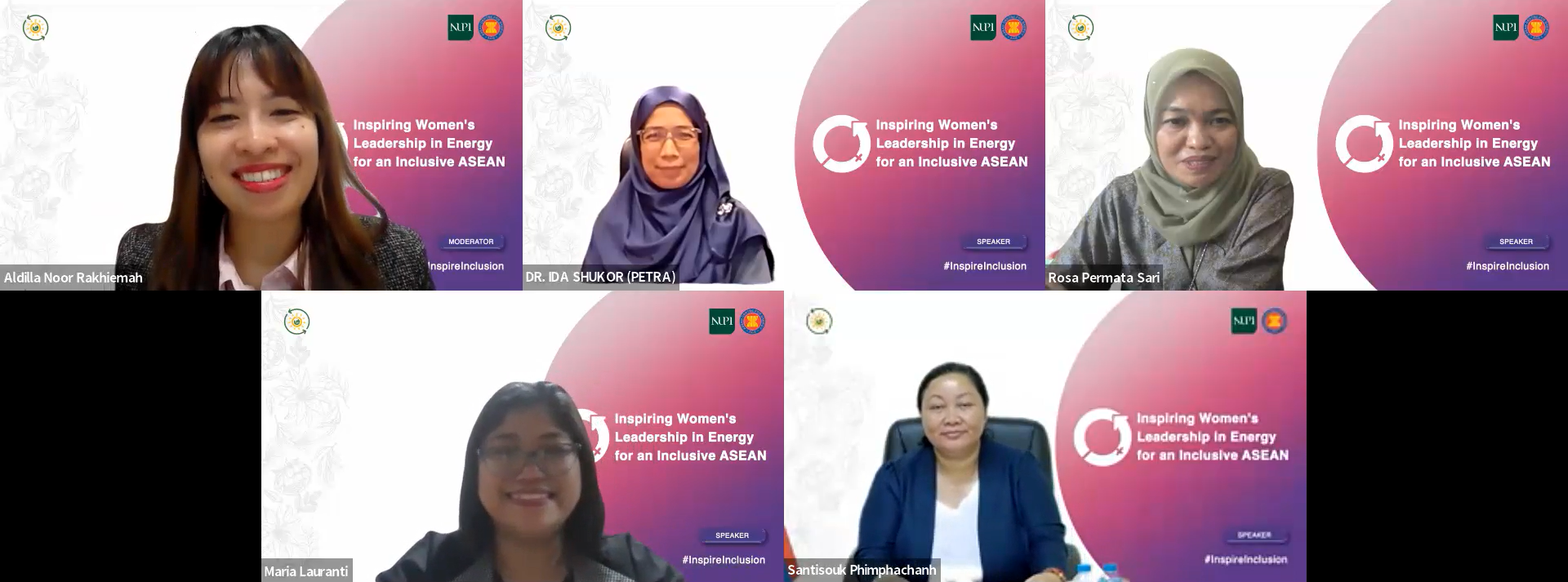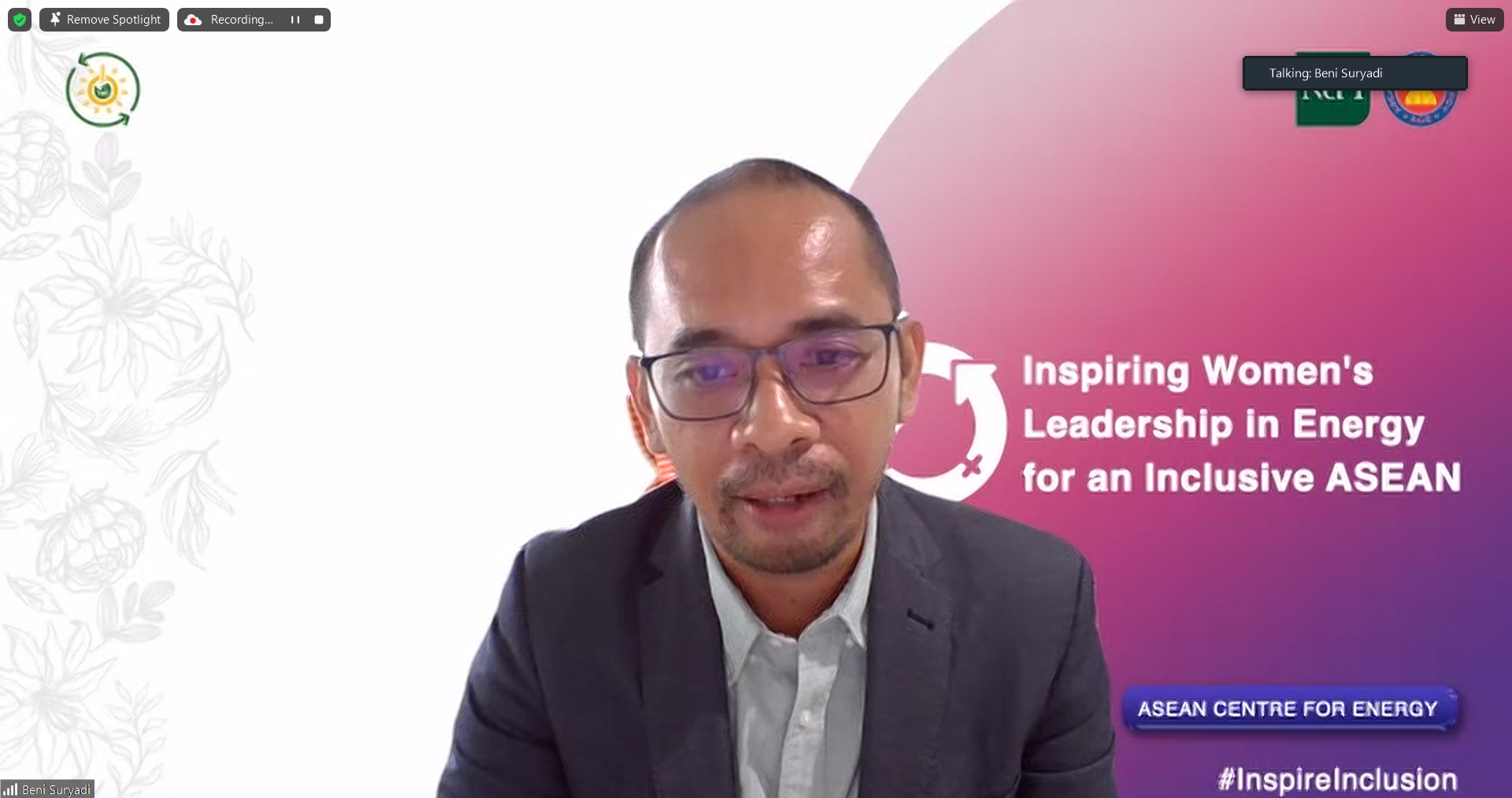i
i
Online, 27 March 2024

Photo 1 All Panelist for ACE International Women’s Day 2024 Webinar
At the culmination of IWD celebrations here at the ASEAN Centre for Energy (ACE), supported by the ongoing energy gender projects, namely the ASEAN Climate Change and Energy Project (ACCEPT), the initial implementation of the ASEAN RE-Gender Roadmap supported by the EmPower Project (UNEP and UN Women), and upcoming one with the Oxfam International had just successfully organised a webinar addressing an identified gender gap within the ASEAN energy sector . Recognising that women only make 67% of the energy industry workforce worldwide—and only 8% ASEAN women are employed in this industry —the webinar intends to raise awareness on gender equality’s significance, inspire and support the inclusion of women in decision-making process, and to foster a collaborative network among stakeholders to drive tangible impacts on gender equality within the energy sector. Carrying the theme “Inspiring Women’s Leadership in Energy for an Inclusive ASEAN”, the webinar took place virtually on 27 March 2024. It hosted a variety of women energy leaders and gender experts from government, industry, and key stakeholders across ASEAN, to support gender inclusivity in ASEAN energy sector.
In achieving the just energy transition, the gender equality gap needs to be addressed to ensure women are not left behind. The transformation actions shall occur in the national and regional level in engaging more women to join the energy industry. Therefore, ACE is spearheading the initiative to encourage more inclusive environment for women in the energy sector. Hence, this webinar also acted as platform for the launch of a gender survey. The “Gender Equality in ASEAN Energy” was also launched to compile current gender equality progress in ASEAN’s energy industry. The webinar is also a part ACCEPT II’s implementation to promote gender equality across ASEAN energy-climate nexus.
An opening remark by Dr Nuki Agya Utama, Executive Director of ACE kicked off the webinar. Dr. Nuki acknowledged the challenge experienced by women in the energy sector and expressed his gratitude to the female researchers at ACE for their achievements and contribution in their respective fields. Key takeaway of his speech is to leverage this webinar as a stepping stone towards the sustainable energy and gender inclusion in the future. Aldilla Noor Rakhiemah, Senior Research Analyst of ACCEPT II began the session with a scene-setting presentation and booklet launching. Aldilla mentioned that women voices will bring fresh perspectives in the energy industry which ultimately create numerous improvements in energy business performance. The role of policymakers is seen as a prominent action to gender mainstreaming changes to uphold gender equality. Yet, the challenge is remaining due to data insufficiency of gender-related programs. Therefore, ACE seen this opportunity to launch a survey on *ASEAN Energy Gender Mainstreaming Effort”. Amira Bilqis, Analyst of ACE conveyed that there is a need to address ASEAN’s position on the interplay of energy and gender. Thus, ASEAN policymakers need to be engaged in gender-mainstreaming efforts. It aims to gauge the current perception on gender equality, awareness in gender inequality within the energy industry, and challenges faced by male and female workers to achieve equality at their workplace. The survey is provided in go.aseanenergy.org/ACEgendersurvey and will be open until April 28th, 2024, 11.59 PM GMT+7.

Photo 2 Panelists in Session 1: Challenges and Opportunities for Women Inclusivity in the ASEAN Energy Sector at ACE International Women’s Day 2024 Webinar
The second part was the two sessions of panel discussions, each has a set of 4 panellist coming from energy leaders and gender experts in ASEAN. The first panel discussion addresses the challenges and opportunities for women inclusivity in the energy sector was moderated Aldilla Noor Rakhiemah. Dr. Ida Syahrina, Deputy Undersecretary at Malaysia’s Ministry of Energy Transition and Water Transformation shared that such challenge can still be manageable if one is inquisitive enough to understand the technicalities of the job by talking to numerous people, especially those that work on-site. Another issue that arises is the gender pay gap. Lao PDR’s representative, Dr. Santisouk Phimphacanh, Alternate SOE Leader at Lao PDR’s Department of Energy Policy & Planning addressed the presence of policy support and unions in the country. Other measures are available, such as the monitoring policies and energy calculation done by human resources departments across the country. However, even if the gender pay gap has been eliminated, there still be issues in the low women workforce, as stated by Rosa Permata Sari, Director of Strategy and Business Development of PT Perusahaan Gas Negara, Indonesia. Thus, the company PT Perusahaan Gas Negara, Indonesia set a target to achieve that women will contribute 30% of the total workforce and managerial positions by 2030. A third area of concern is on ways to strategise inclusivity. Maria Lauranti, Country Director of Oxfam Indonesia conferred that real disaggregated gender data is needed to identify which women groups are disadvantaged the most; then the work can be initiated from there. In addition, she addresses the need to recognise women as agent of change and construct a view based on intersection lenses in developing the gender responsive policy and affirmative policy.
The second discussion addresses ways to pave gender mainstreaming towards an inclusive ASEAN Energy Blueprint. Director Amelia M. De Guzman, The Philippines’ DOE-GAD Technical Working Group Chair stated that the political will and management plays a role in making the change. Although the generic gender toolkit is available, a different toolkit is introduced tailor to energy and gender. In response, Miguel Musngi, Assistant Director of Poverty & Gender Division at the ASEAN Secretary acknowledge the three bottlenecks for ASEAN to keep up in energy gender nexus, which are unpaid women, gender stereotype and lack of women leaders in policymaking. Dr. Amy Reggers, Regional Programme Specialist of UN Women’s Climate Change and Gender brought forth point to strengthen the technical skills which suits the location, institutionalise the policy. An insightful view by Ana Rojas, Gender and Energy Specialist at the UNDP Sustainable Energy Hub and Gender, highlighting energy as a catalyst to gender equality and the needs to outline the clarity in drafting the policy besides the call for monetary assistance to compliment the policy.

Photo 4 Closing Remarks deliver by Beni Suryadi, Project Manager of ACCEPT II at ACE International Women’s Day 2024 Webinar
At the end of the session, Beni Suryadi, Project Manager of ACCEPT II emphasized women’s role is energy leadership is invaluable and crucial in overcoming systemic challenges. Women talents has the potential to lead the charge in transforming the energy sector towards more sustainability. ACE’s initiative is driven by our aspiration to champion gender inclusivity, recognising the untapped potential of women in spearheading innovation and change in the energy landscape. As a way forward, ASEAN Centre for Energy through its gender projects, including the ASEAN Climate Change and Energy Project, is at the forefront of this transformative effort and in the future, more upcoming panel discourse could be considered in support to gender inclusion initiatives.
(SNF & IB)
Join our ASEAN Researchers Network on Climate Change (ARNECC) by registering yourself here. Become a part of our collaborative efforts to address pressing climate challenges and shape a sustainable future.
Detailed information on ACCEPT II can be found at https://accept.aseanenergy.org/
We welcome any future collaboration, please feel free to contact us at [email protected]